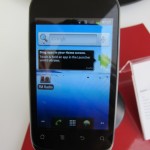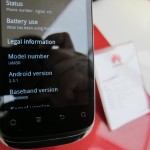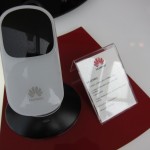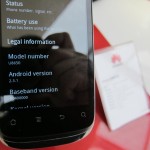Huawei is bringing a series of low-cost Android phones to Singapore this month, in the hope of winning over a part of the market that tech-savvy Singapore users often don’t spend too much time checking out.
While we are talking up the Samsung Galaxy S II and Sony Ericsson Xperia Arc, phones closer to the S$1,000 mark (without contract), Huawei has been banking on the low-cost segment (S$300 to S$500) where Android can play a big part. Hey, the software is free, after all.
This is where the Ideos X3, a followup to the original Ideos, comes in. The new Android phone will cost just S$299 when it ships on June 15, said Huawei executives who launched the phone along with three other low-cost numbers yesterday in Singapore.
Considering that telco rebates here often start from about S$300, don’t be surprised to see this phone debut with one of the operators here as a “zero-dollar” phone.
What do you get for paying, er, nothing? Huawei’s biggest selling point is Android 2.3, the latest iteration of the most popular phone OS out there. A 3.2-inch HVGA capacitive touch-screen and a 3.2-meg camera, among other features in a 115g frame. To be sure, the X3 has got no Super-AMOLED, no shiny 4.3-inch screen and certainly no dual-core processor.
Competitors in the field include Samsung’s Galaxy Mini running Android 2.2 (S$368), which is often sold as a zero-dollar phone as well. But Huawei will boast that the Ideos X3 is the only one with Android 2.3 for the low-end market.
Does that matter? I’m not sure because at that end of the market, presumably less geeky users would look at more obvious features like screen size, screen quality and yes, smoother performance. Here, the Ideos X3’s 600MHz CPU shows its age when you swipe your finger on the screen – it betrays a very slight lag, compared to smartphones powered by a 1GHz or faster chip.
To be fair, I still found the phone to be quite usable on the whole, for an entry-level aimed at first-time smartphone buyers. For for “zero-dollar” phone, I’d recommend it over another Nokia Symbian or “feature phone” (or “dumb” phone) for folks looking to jump on the smartphone bandwagon.
Besides the Ideos X3, Huawei yesterday also unveiled two other phones and a “Mi-Fi” dongle. Here’s what I thought of them after a quick hands-on session:
Huawei Boulder (S$299, end June): Another low-cost option for those who want a keyboard to go with a touchscreen, this comes with Android 2.2 and some social media network features. I’m wondering if this will fly well in Singapore, as the social media crowd are often also quite the tech-savvy lot.
Huawei IDEOS X6 (S$499, end June): An interesting offering that looks a bit like a cheaper version of the Sony Ericsson Xperia Arc. Note the big infinity edge screen (4.1-inch), the squarish facade and 1GHz processor for much smoother operation than the X3. Runs Android 2.2 but will be upgradeable in Q4 2011, says Huawei.
Huawei Mobile WiFi Smart Pro (S$299, Q3 2011) – a handy and sleek-looking Wi-Fi sharing dongle that will share the HSPA+ mobile connection (21Mbps up, 5.76Mbps down) with other devices through your own portable Wi-Fi hotspot. Great for mobile warriors.












You said, “To be fair, I still found the phone to be quite usable on the whole, for an entry-level aimed at first-time smartphone buyers. For for “zero-dollar” phone, I’d recommend it over another Nokia Symbian or “feature phone” (or ”dumb” phone) for folks looking to jump on the smartphone bandwagon.”
How is this better than a Nokia Symbian phone such as the C7 or N8? Please explain.